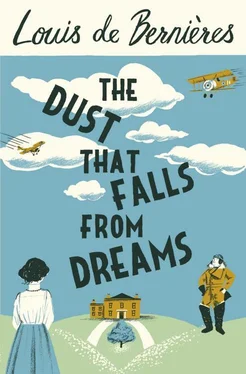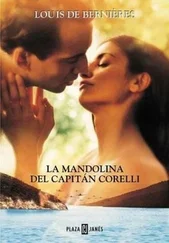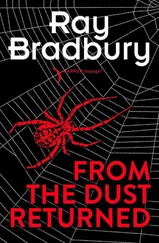‘It was hell beyond all hell,’ replied Rosie, ‘and I’m still very sore, but the moment it was over, all the agony just disappeared.’
‘You’re going to have the whole family going in and out all day. They can’t wait. But I insisted on being first. Now I want to hold her.’
Having been instructed to support the baby’s head at all times, he gathered it up and looked at it. It smelled very sweet, like warm hay. Babies all look the same, unless you happen to be the parent, so Daniel gazed down rapturously at the tiny, wrinkled, crimson-faced creature and saw nothing but intelligence and beauty. He felt a deep, painful wave of love welling up in his stomach, and started to gabble to the child as he paced up and down the room with her, in a state of elation and triumph.
After several minutes of this, Rosie said, ‘Please will you stop speaking French to her? It makes me feel left out.’
Daniel felt briefly cross, but then smiled at her. ‘Sometimes, one language just isn’t enough, is it?’
Rosie already had an apprehension and an intimation of how her child might become removed from her. It had not previously occurred to her that in that respect Daniel might become her enemy, but now she saw it very clearly. ‘Give her back to me,’ she said, holding out her arms.
Reluctantly Daniel gave up the baby, kissed Rosie on the forehead, and went downstairs for breakfast. When he looked in half an hour later, his daughter was back in her cot, and Rosie was asleep, so he picked Esther up and took her to the window. He looked into the unfocused blue eyes and said, ‘You’re just like a little mushroom. Tu es une petite champignonne. Champi champi champignonne. Mais comme tu es belle et charmante. Et tellement petite. Ma champignonne mignonne .’ He put his forefinger into her palm, and her tiny fingers closed on it. She kicked and bucked in his arms, and he was surprised by her strength.
That was how Daniel arrived at his private pet name for Esther. She became ‘Champignonne,’ and inevitably he contracted it to ‘Shompi’.
MRS MCCOSH FOUND her husband in the dining room, where he was replenishing his Bladnoch decanter, and sniffing it appreciatively.
‘My dear,’ she said, ‘we need a lady maid. Rosie is quite exhausted, and Millicent is no substitute for the real thing. I always used to have a maid, and now I can’t for the life of me remember why I don’t any more.’
‘She went to work in a munitions factory,’ said Mr McCosh shortly, ‘and turned yellow. And I used to have a valet, but now my things are collected and taken to a laundry.’
‘She was quite a good maid,’ said Mrs McCosh, ‘very agreeable and amenable, but I would greatly prefer someone a little more distinguée .’
‘ Distinguée ? In what sense might a maid be distinguée ?’
‘A lady maid, my dear! A lady maid is distinguée !’
‘A lady maid. What is a lady maid? Is that any different from a lady’s maid?’
‘A lady maid, my dear, is from a good family that has fallen on hard times. She is a lady, but she finds herself in reduced circumstances and in need of employment. She is finely educated, has a delicate temperament, fine sensibilities, and knows everyone one ought to know. A lady maid, my dear, is quite in vogue at present.’
‘How could one possibly not go along with what is in vogue?’ said Mr McCosh. ‘Fancy that! A fallen aristocrat in the house! How perfectly indispensible!’
‘I perceive that you are unconvinced. You are waxing ironical.’
‘Well, it is true that Rosie is exhausted — Esther does wail a lot at night. And it is also true that Millicent isn’t really up to attending to you and your finery as well as scrubbing things left, right and centre and emptying ash out of the fires. Millicent, I believe, is grossly overworked, and I have long felt anxious to do something about it. It is also true that a “lady maid” will cost an extra twenty-five pounds a year, or thereabouts. Whence do you propose to derive the money for her wages, my dear? Are you planning to take up painting and sell your masterpieces? Will you play your violin in the Haymarket?’
‘The money will come from you, my dear,’ answered Mrs McCosh firmly.
‘From me? Now, there’s a surprise.’
Mr McCosh took another sniff at the whisky, which put him in a better mood quite promptly. He said, ‘I will go along with this on condition that your lady maid helps Rosie as a nurse, and then, possibly, as a governess, and if she also helps Millicent and Cookie with their duties as required. If I am to have a fallen aristocrat in the house, she is not to be purely decorative, and if at any time I find that she has become so, I will dismiss her.’
‘It is up to me to hire and dismiss servants,’ said Mrs McCosh. ‘As master of the house, you should not concern yourself with the matter.’
‘If I wish to dismiss her, and you wish to retain her,’ answered her husband. ‘It is easily done. You will pay her from your allowance.’ Mrs McCosh huffed at this outrageous suggestion, and Mr McCosh said. ‘I will be intrigued to see what you come up with.’
Accordingly Mrs McCosh went by train and omnibus to the nearest registry, and within a month a quiet and dignified young woman was installed in one of the empty rooms at the top of the house.
She was pale-skinned and a little freckled, with tight brown curls, and dressed in very fine clothes that had been skilfully repaired. She spoke the most elegant English with the trace of an Irish lilt, and she had enormous grey eyes that radiated a kind of beautiful sadness. Her name was the Honourable Mary FitzGerald St George.
Mary took to Esther straight away, and had the ability to hush her when she was in one of her periodic fits of infantile hysteria. This made Rosie feel somewhat inadequate, however grateful she was. Mary helped Mrs McCosh to dress for the evenings, and proved to have such exceptionally good taste that Mrs McCosh even took her along when she went shopping. It would be true to say that the Honourable Mary FitzGerald St George considerably lightened the heart of her mistress. Gaskell painted Mary’s portrait one day, making her look like a Valkyrie, and Christabel took some photographs of her in the garden that made her look like a dreaming poetess. These representations were admirably juxtaposed at their joint exhibitions.
One evening, after returning from London, Hamilton McCosh encountered the Honourable Mary FitzGerald St George in the morning room, and said to her, ‘Miss FitzGerald St George, may I have a word? In the dining room perhaps?’
Mary sat in the carver at one end of the table, and Mr McCosh in the carver at the other.
‘Now, Miss FitzGerald, please tell me about yourself, would you? I have only what I know from my wife. I realise that the servants are her business, but I do like to take an interest myself. Now that there are so few of them, it has become very much easier.’
‘Indeed, sir, what would you like to know?’
‘Well, your father is …?’
‘Roderick FitzGerald St George, Earl Edenderry. I’m his fourth daughter, sir.’
‘And Edenderry is near Dublin?’
‘Not so very far, sir. And not so very far from Tullamore.’
‘Anglo-Irish?’
‘Oh yes, sir, for centuries, sir. There’s an awful lot of us, sir. We don’t feel as welcome at home as we used to, though.’
‘Quite so. Have you heard of Edmund Burke?’
‘Yes, sir, but I can’t say I know very much about him.’
‘He used to say he was Irish and he used to say he was English, quite interchangeably. It was all one to a lot of people. Sadly, those days are past.’
Читать дальше












